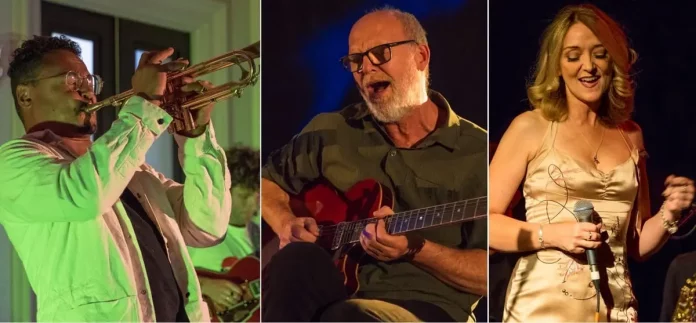The Buxton International Festival is well known for opera, literature and classical music but this year, 7-10 July, it added a significant jazz programme for the first time. The Palace Hotel hosted most of the performances with others at the splendid Matcham-designed Opera House and the capacious Victorian Pavilion Arts Centre.
A high bar was set from the start by London-based trumpeter Jay Phelps’s quartet on Thursday evening. Tom Ford was on guitar, James Owsten on bass and Jim Bashford on drums. Their set, which included Night In Tunisia, Miles Davis’s Yesterdays, Criss Cross, Cedar Walton’s Martha’s Prize, Just Friends, Woody’n You and Dexter Gordon’s Cheesecake, was well received by the capacity audience. Phelps was on top form, exhibiting an equal ability to play both soft and loud in the upper register. Ford was exquisite on guitar, Owston intricately impressive on bass and Bashford superbly hard driving on drums.
Ian Shaw and Guy Barker named their Friday performance City To City to reflect how musicians spend their working lives either staying in places away from home or in travelling to those places. Numbers included Mark Murphy’s I Keep Going Back To Joe’s; a medley of South Side Of Chicago, Slow Boat To China and Do You Know What It Means To Miss New Orleans; Glen Campbell’s Wichita Lineman; Ray Davies’ Waterloo Sunset (with Barker superb on flugelhorn); and Cole Porter’s Get Out Of Town. Somewhat differently, there was a poignant moment when Shaw, singing at the piano, delivered a soulful rendition of Everything Will Be Alright in memory of Tina May, who died in March this year from a brain tumour.
Before Guy Barker came on stage Shaw told us the trumpeter had recently been seriously ill in hospital. Some wondered how he’d perform because of this but there was no need to worry. Barker’s delivery was spot on and his ability to play sustained notes with circular breathing was undimmed. Both musicians larded the session with anecdotes and tales from their past. Shaw confirmed his reputation as the master of innuendo and playful sleaze in relaying his personal stories and Barker supplied his own amusing recollections from a chequered past. It was interesting to hear for instance that the latter’s father had been a stuntman and was the naked figure who ran into the sea at the beginning of each television episode of The Fall And Rise Of Reginald Perrin.
On Friday night the mighty 18-piece Swingtime Big Band hit the stage at the Pavilion Arts Centre with an array of classic numbers from the likes of Woody Herman, Count Basie, Glenn Miller and Buddy Rich. It was another sell-out audience. During the course of the show, the band’s vocalist Emma Holcroft made several entrances to deliver a repertoire of jazz standards such as Fascinating Rhythm and Just In Time with humour and pizazz. The crowd loved it. Ian Shaw came on as a special guest to sing a couple of numbers after the interval and Guy Barker boosted the band’s trumpet section.
Saturday was seen in by The Impossible Gentlemen with Laurence Cottle on bass in place of previous bottom-enders Steve Swallow and Steve Rodby and Ian Thomas replacing Adam Nussbaum on drums. The band’s founding fathers, Mike Walker on guitar and Gwilym Simcock on piano, completed the lineup. This was a pulsating delivery which at times approached the sound level of a rock band. Their song list included Heute Leute, Mr Roll Over (penned by Simcock about his six-month-old son), A Simpler Time, Laugh Lines (written by Walker, who informed us he regretted composing it as it’s hard to play) and lastly It Could Have Been A Simple Goodbye. After tumultuous applause from the audience and demands for more the band bowed out with Barber Blues.
The foot-tapping AMC Gospel Choir opened Sunday with their spirited combination of gospel, soul and R&B. This superbly energetic performance really warranted a dance floor for its delivery. They were followed later in the afternoon by the Xhosa Cole Quartet with Cole on tenor sax, Steve Saunderson guitar, Josh Vadiveloo bass and Nathan England Jones on drums. In introducing the set, Cole informed us that a fair proportion of their music had been influenced by Thelonious Monk. They began with Andy’s Shuffle – a tribute to Jamaican-born saxophonist Andy Hamilton who lived and worked in Birmingham, where the band hails from. It was followed by Monk’s In Walked Bud, Played Twice and Frederick Loewe’s Almost Like Being In Love amongst others. Cole was adroit and technically dexterous on sax and he had a nice line in repartee which went down well with the audience. Delivery by the band was tight and highly enjoyable.
Over the weekend there were also three late-night slots until 12.30 am with the Graham Clark Quartet on Friday, Dave Hassell’s Hydra on Saturday and the Kirk McElhinney Trio on Sunday.
It was Clare Teal and her sextet at the Opera House on Sunday night who closed the festival on a high for many. Joe Webb was on piano in place of Jason Rebello. Pete Horsfall was on trumpet, Giacomo Smith on clarinet and sax, Dave Archer on guitar, Simon Little on bass and Ed Richardson on drums. Teal opened with It’s Raining followed by Let’s Do It, The Way You Look Tonight, Dream A Little Dream Of Me and Into Each Life Some Rain Must Fall, the latter being sung in duet with Horsfall. Indeed, half the band seemed to have great singing voices with Smith and Little also contributing to the vocals at different points in the show. As always, Teal was adept in communicating naturally and humorously with her audience and it was clear that her fan club had come to see her. When she finished with It Don’t Mean A Thing and When You’re Smiling they were cheering in appreciation.

















